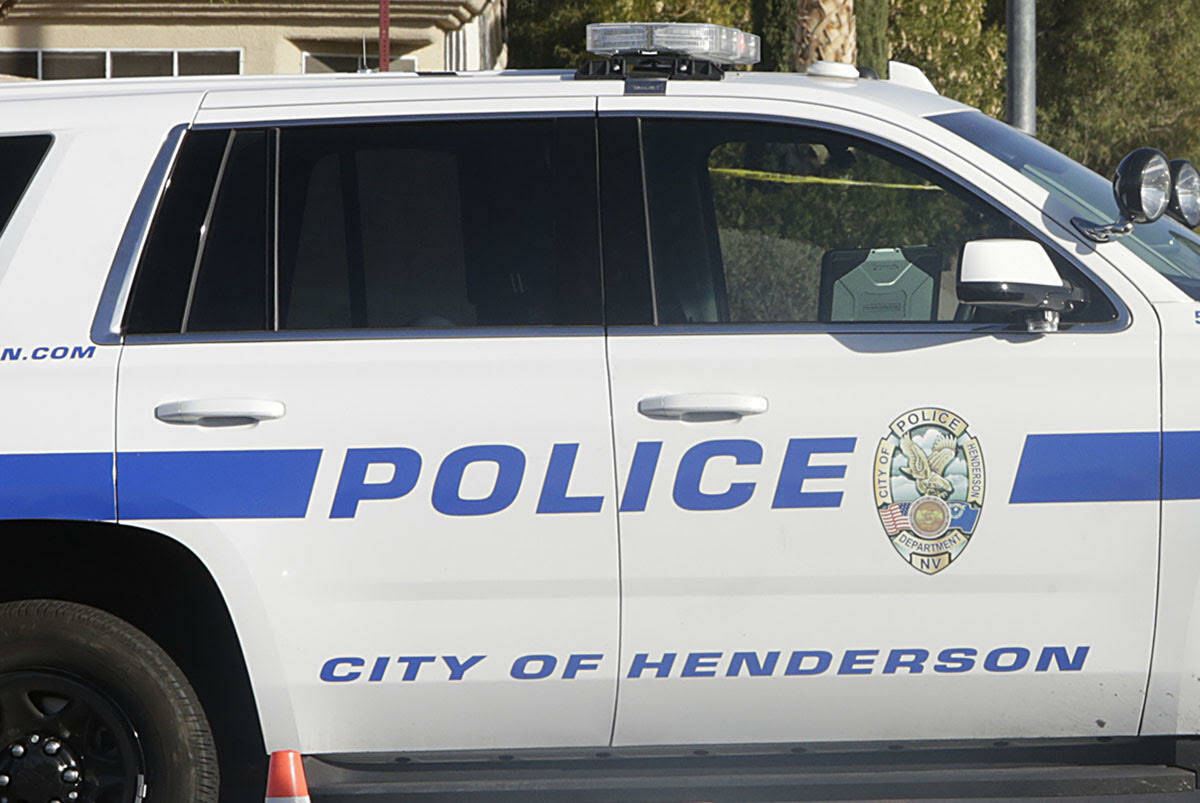New Henderson police code outlines 98 different rule violations
Henderson’s two police unions have updated their disciplinary codes to be longer and more specific, while also implementing a reviewing authority to oversee decisions.
The Henderson City Council unanimously approved two items at Tuesday’s City Council meeting that changed the bargaining agreements for the Henderson Police Officers’ Association and Henderson Police Supervisors’ Association, revising the unions’ agreements to overhaul how they approach discipline for members.
The previous agreements had a four-level grievance procedure that featured four levels of discipline: suspension, demotion, disciplinary probation and termination for employees that either don’t correct performance issues or commit serious violations of code.
But that procedure is now replaced by a new code of conduct that outlines 98 different possible rule violations, assigning each of them a ranking from one to seven. Each ranking, or “class” as outlined in the proposed agreement, carries a penalty for the code violations that get more severe as the number gets higher. For a Class One offense, employees get a written warning; for a Class Seven, they get fired.
Henderson Police Chief Hollie Chadwick said the new code will allow for more discipline to be handled at the supervisor level, instead of by internal affairs. She said supervisors would handle smaller issues, while internal affairs focuses on serious breaches of conduct that need proper investigations.
“There was stuff in the past that was sent to internal affairs that probably didn’t need to rise to that level, it needed to be addressed at a supervisor (level),” Chadwick said.
Under the new code, Chadwick said things like mistakes in making records, improperly addressing something minor at a scene and other procedural errors would be left to supervisors, while major breaches of the code of conduct that “violates policies” and “goes against the standards” the department holds for its staff will be sent to internal affairs.
‘Benefits everyone involved’
According to the code, only Class One violations may be referred to a supervisor, and only after the reviewing authority allows it.
The reviewing authority is made up of department supervisors, whose rank depends on the class of violation they can review: lieutenants for Class One and Two violations; captains for Class One through Three violations; and Deputy Chiefs for all class violations. The reviewing authority has 30 days to come to a decision following a disciplinary investigation.
In all cases, the reviewing authority goes over investigations after they’ve been concluded and can decide to:
— Send the case back for further investigation
— Send the case back to investigate misconduct that was not in the original complaint
— Request an extension beyond their initial 30-day time limit for a decision
— Forward the discipline decision to internal affairs to issue to the employee
— Refer Class One matters to the officer’s supervisor
Of the 98 possible rule violations outlined in the code, less than a third fall into that class. Slightly more rule violations — or 31 — are considered Class Seven, includes offenses like excessive use of force, claiming false time worked for more money and being drunk on the job.
William Sousa, director of UNLV’s Center for Crime and Justice Policy, said Henderson’s police unions changing their discipline policy to be more specific is part of a larger trend among police departments, and that the move to a longer and more specific code removes a lot of discretion from department discipline.
“To the best of my knowledge, when policies are written with more specificity, it generally benefits everyone involved,” Sousa said.
The more specific department codes also effectively bring a higher level of transparency to everyone who can read them, according to Sousa.
The item would also change guidelines for assignment differential pay, where officers are assigned to one of 18 specialized positions or 32 specialized supervisor positions, where they receive an 8 percent pay increase to compensate. The new code allows for two additional officer positions and one supervisor position to qualify for differential pay, as well as clarifying that differential pay applies to officers serving in the positions for more than 30 days with no specific end date.
When speaking in public comment, Henderson Police Officers’ Association President Shawn Thibeault praised Chadwick and the department for tackling the assignment differential pay issue in the new code, calling her an “enlightened employer.”
Thibeault told the Review-Journal before the meeting that the process of amending the collective bargaining agreement was seamless, thanks to an open line of communication between the union and the administration.
“It’s been a pretty seamless process,” Thibeault said. “We have a direct line of communication with the chief, so any questions that are posed, we can call up the chief and find out what’s just the way you want to go.”
Contact Mark Credico at mcredico@reviewjournal.com. Follow him on Instagram @writermark2.

















